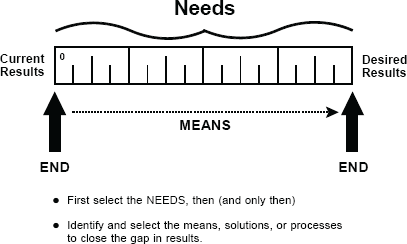Need is NOT a Verb!1
Conventional English-language usage would have us employ the common word “need” as a verb (or in a verb sense)—to identify means, methods, activities, and actions and/or resources we desire or intend to use. Terms such as “need to,” “need for,” “needing,” and “needed” are common, conventional, and destructive to useful planning. This is important because we have already seen that it is important to distinguish means from ends. When you use “need” as a verb, you are jumping into a solution—actually demanding a solution such as “we need more money”—before defining what gaps in results and selecting a means that will close that performance gap.
As hard as it is to change our own behavior (and most of us who want others to change seem to resist it the most ourselves!), it is central to useful planning to distinguish between ends and means. We have noted this in Chapter 4 as Critical Success Factor 2. To do reasonable and justifiable planning, we have to (1) focus on ends and not means and, thus, (2) use “need” as a noun. Need, for useful and successful planning, is only used as a noun—as a gap between current and desired results as shown in Figure 7.1.
Figure 7.1. A need (as a noun) is a gap between current results and required results.2
If we use “need” as a noun, we will be able to both justify useful objectives as well as be able to justify what we do and deliver—evaluation based on comparing our objectives with our results—on the basis of costs-consequences analysis. We will be able to defend everything we use, do, produce, and deliver. It is the only sensible way we can demonstrate value added.3

